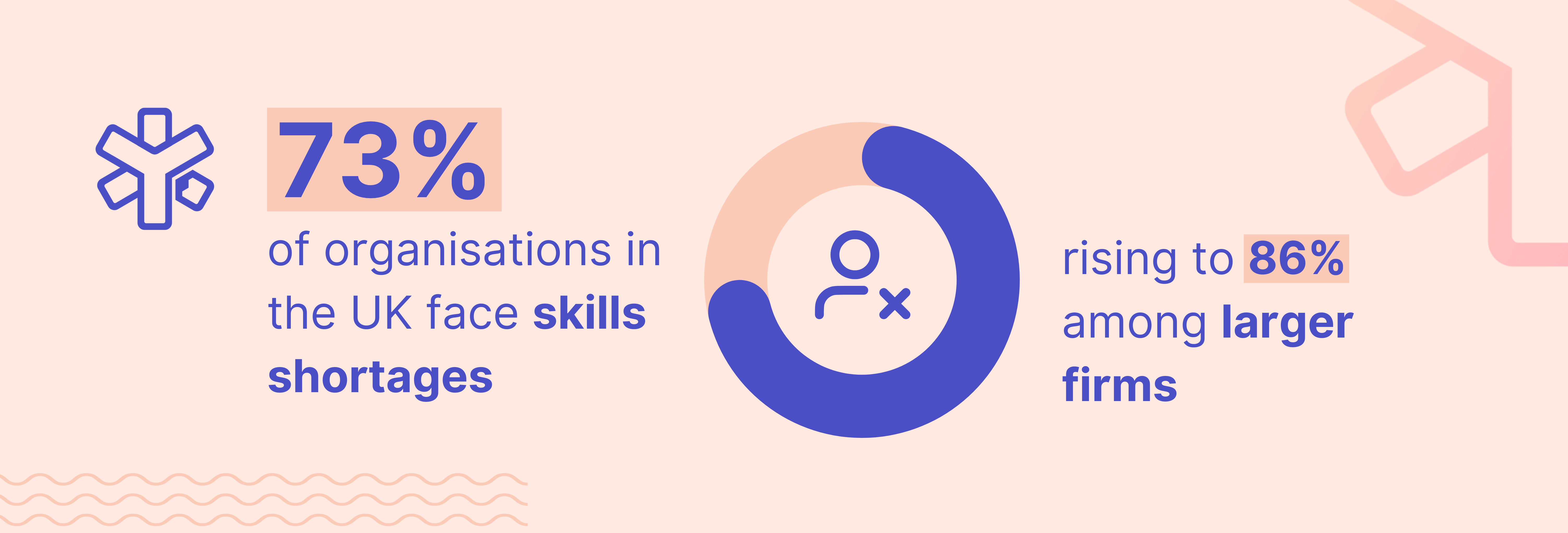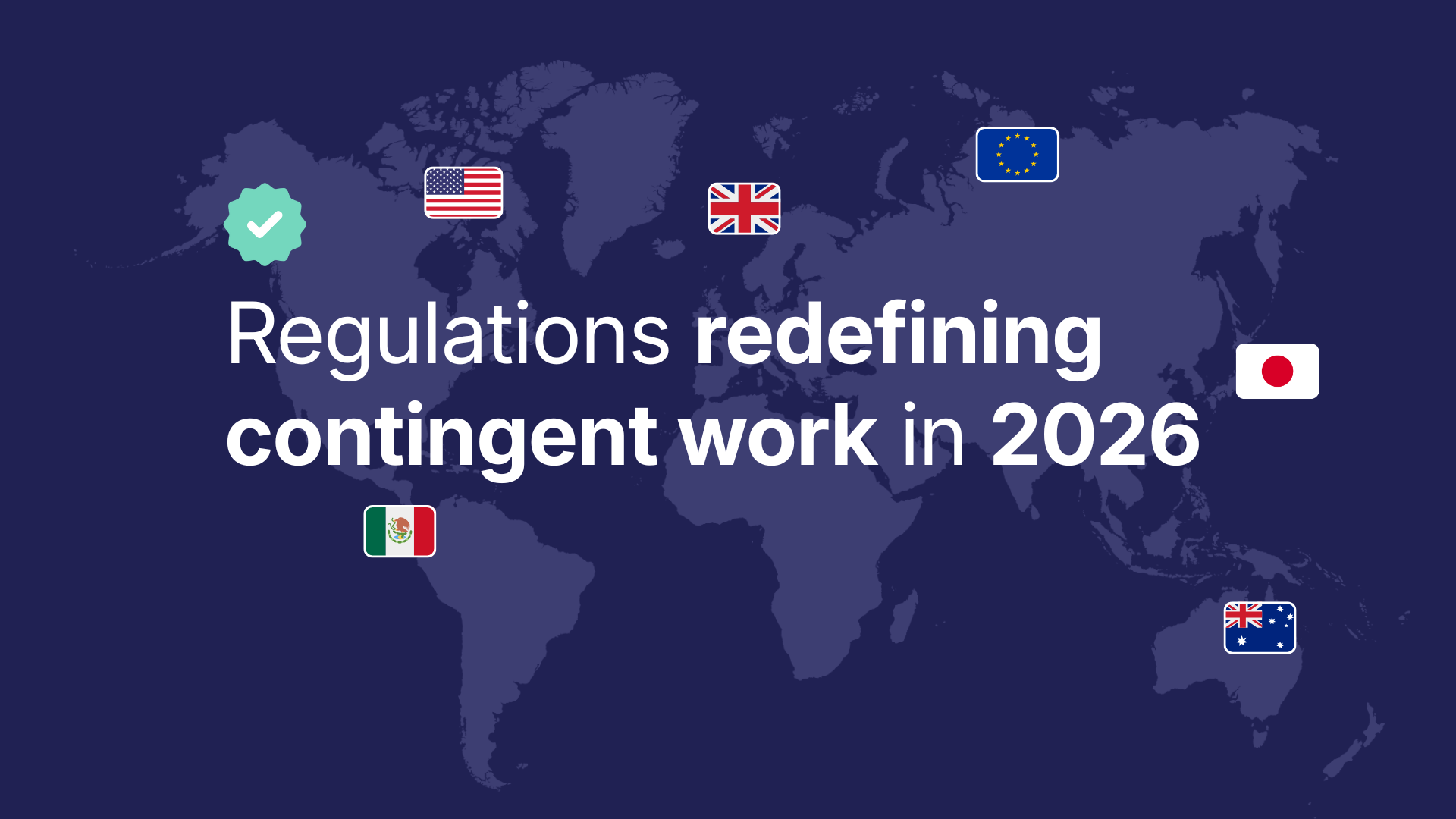In a rapidly evolving job market, understanding the hiring trends for 2024 is crucial for organisations worldwide looking for a strategic advantage. This is especially true for those relying on attracting the best freelance talent to fill skills gaps on both short-term and long-term projects.
To navigate the hiring market in the coming months, getting ahead of the curve on skills hiring and skills management is a must. Here are 12 skills hiring and management trends that we think you’ll likely need to focus on this year.
1. Skills shortages remain prevalent
A recent Open University report found that a staggering 73% of organisations in the UK face skills shortages, rising to 86% among larger firms. With this trend prevailing globally, the urgency for skills-based hiring, where the focus is on the specific skills and competencies candidates bring to the table, rather than traditional credentials like experience and education, is crucial.
Focusing only on what skills workers have and how they match up to the skills you require in your organisation will lead to faster hiring and less time spent getting new hires up to speed. Find out more about what you need to do in our comprehensive guide to skills-based hiring.
2.Skills audits become more popular
The same study found that to combat these shortages, 23% of organisations are conducting skills audits to understand their workforce's capabilities better. This is a proactive approach that will undoubtedly help these companies identify gaps and plan for future skill needs, making skills-based hiring more targeted and effective.
This approach also highlights areas where it might make more sense to hire a freelancer or contractor over an employee if, for example, the required skill is only needed for a short-term project with a looming deadline.
If you’re looking to hire a top freelancer quickly, check out our marketplace of vetted freelance talent from around the world.

3. Generative AI skills are in high demand
Companies are looking for workers with skills in generative AI to help them take advantage of this overwhelmingly prevalent trend in every area of work. 76% of HR leaders agree they will lag in organisational success if they don't adopt and implement generative AI within the next 12 to 24 months.
4. Staff training becomes critical
The trend towards valuing skills continues with 41% of organisations implementing staff training plans, a key part of skills management in any company. This aligns with the shift towards valuing skills and continuous learning, critical for adapting to the digital economy.
5. Diversity, equality, and inclusion initiatives come to the fore
A quarter of organisations now have plans around diversity, equality, and inclusion. This trend highlights the recognition of diverse workforces as a competitive advantage, emphasising the need for inclusive hiring practices that value skills and potential over background and experience.
6. Age continues to become less relevant
With 31% of firms noting a net increase in employees over 50, adapting hiring practices to be more inclusive of experienced workers and leveraging their skills becomes vital. This trend also supports the broader movement towards skills-based hiring, where age is less of a barrier.
"Using trends and analysis, we can see patterns, dependency on certain skill sets and recurrent use of contingent workers. We can use these insights to bolster our perm teams and help promote the skill sets we have access to for our customers. This gives us flexibility to scale up and down where needed, for pitches that call for specific requirements, for example visualisation for fashion clients."
Amy Clarke, Senior Talent Acquisition Partner, Havas UK
7. Hybrid workplaces demand new cultures
As the traditional office culture evolves, there's a pressing need for organisations to foster connectedness in hybrid environments. Gartner highlights the crisis in culture connectedness, emphasising the importance of creating a strong, inclusive culture that resonates with both on-site and remote workers.
8. Embracing flexibility and productivity brings a competitive advantage
With only 26% of organisations seeing full compliance with on-site attendance, and nearly 50% of employees viewing their performance as unsustainable, the trend is towards more flexible work arrangements.
Companies that embrace better remote working cultures open themselves up to a wider pool of talent from around the world, making it easier to fill the skills gaps and giving them a competitive advantage over companies who fail to adapt to a culture of remote work.
9. Companies look to build trust
Mutual mistrust between employees and organisations is a significant challenge, especially with the trend in layoffs seen in 2023 continuing into 2024 in many industries. Emphasising skills-based achievements and transparent communication can help build trust which in turn results in a happier workforce.
10. Using skills management to combat change fatigue
The rapid pace of change over the last few years has left many employees feeling disempowered. Organisations that manage change effectively, by focusing on skills development and providing clear paths for growth, can mitigate this fatigue and keep their workforce engaged and adaptable.

11. Adaptive career paths
Another prevalent trend found in Gartner’s study is the shift towards designing adaptive career paths. By breaking work into shorter cycles and allowing employees to experience different career options, companies can retain talent more effectively. This approach requires a good understanding of the skills within the workforce and aligns well with the principles of skills-based hiring.
12. Global hiring continues
With the global economy continuing to be sluggish at the start of 2024, many companies are realising that with global hiring, reducing costs doesn’t necessarily mean reducing skills. Many new centres of freelancing excellence are establishing themselves globally, offering access to skilled workers on a freelance basis that companies can tap into for short, medium and long-term projects.
A recent Forbes article highlights this growing trend in countries like Kazakhstan, Capetown, Berlin, Singapore and Lisbon - opening up options outside of the typically more expensive options of London and San Francisco.
Looking for specific skills for your workforce?
If you’re in need of skilled workers to get your latest projects up and running, check out our freelance marketplace. With a vetted list of over 100,000 global freelancers to help you meet your goals, you’re bound to find the perfect skills match.







